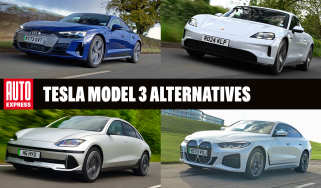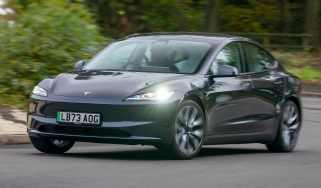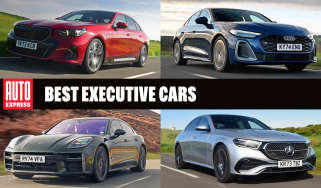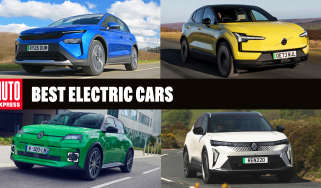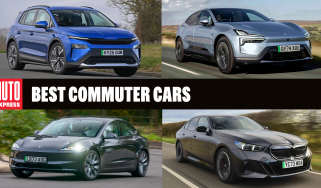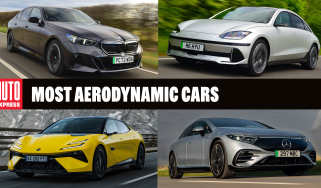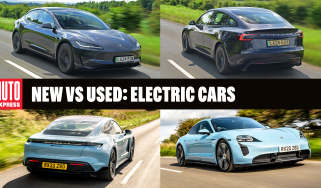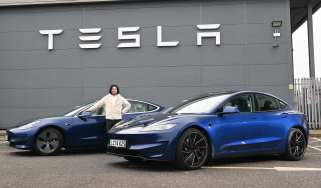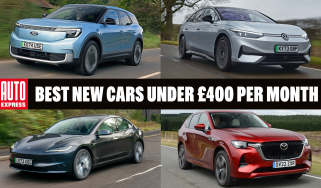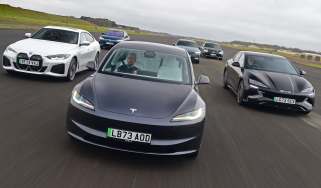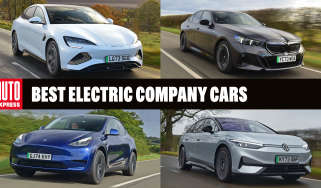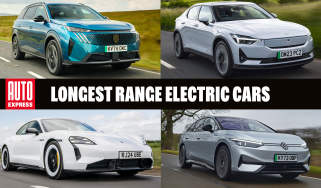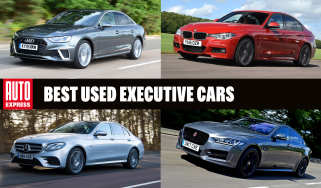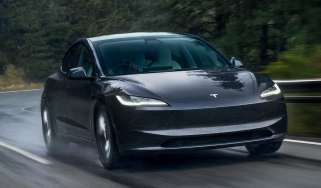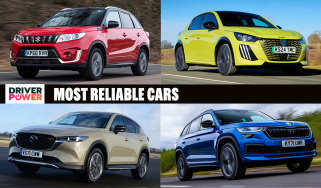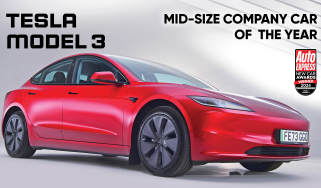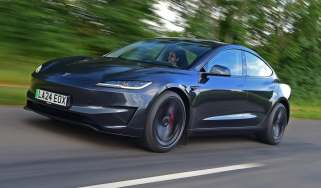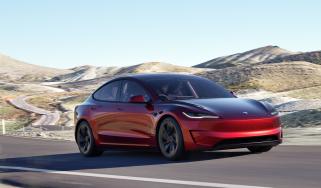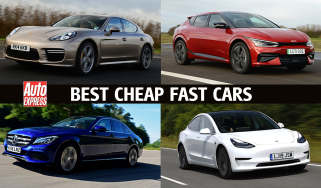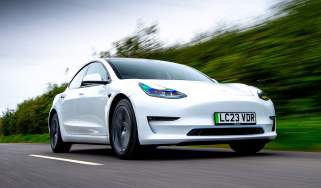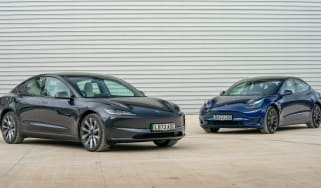Tesla Model 3 review
Despite many talented EV rivals, the technology-packed Tesla Model 3 remains one of the very best electric cars around

Our opinion on the Tesla Model 3
The Tesla Model 3 is one of the best electric cars around. It’s practical, high-tech, and boasts great performance and range for a competitive price. The all-electric saloon’s facelift only sweetens the deal, improving build quality and refinement, giving it a slightly snazzier look, and boosting the already excellent range up to around 400 miles in some versions.
It’s big enough to work as a family car and is a relaxed place in which to spend time. Access to the Tesla Supercharger network and the car's excellent navigation system, which also precondition the battery ahead of charging stops, all help when tackling long journeys. It's fast too, even in its most basic rear-wheel drive form, while the all-wheel drive Model 3 Long Range and Performance models will show plenty of sports cars a clean set of heels away from the traffic lights. As long as you’re not intimidated by the cutting-edge technology or the minimalist interior, the Tesla Model 3 is a great option.
| Key specs | |
| Fuel type | Electric |
| Body style | Executive saloon |
| Powertrain | 60kWh battery, 1x e-motor, rear-wheel drive 79kWh battery, 1x e-motor, rear-wheel drive 79kWh battery, 2x e-motors, four-wheel drive |
| Safety | 5-star (Euro NCAP, 2025) |
| Warranty | 4yrs/60,000 miles |
About the Tesla Model 3
The Tesla Model 3 is the smallest and most affordable model to date from the pioneering electric carmaker, sitting below the Tesla Model Y in the brand's UK lineup. The compact all-electric saloon first went on sale in the UK in 2019, winning the title of Auto Express Car of the Year that same year, and has gone on to become one of the best-selling EVs in the world.
Used - available now

2023 Tesla
Model 3
44,536 milesAutomaticElectric
Cash £18,200
2023 Tesla
Model 3
72,888 milesAutomaticElectric
Cash £15,800
2023 Tesla
Model 3
32,507 milesAutomaticElectric
Cash £20,200
2023 Tesla
Model 3
44,503 milesAutomaticElectric
Cash £19,000To keep the Model 3 in fighting shape, Tesla gave its entry-level car a mid-life facelift, but the improvements weren’t isolated to a new bumper and a fresh set of headlights. The Model 3 added even more tech, improved build quality and refinement, as well as increased the range. The base Rear-Wheel Drive Model 3 can now cover up to 318 miles on a single charge (up from 305 miles in the pre-facelift model), while the Dual-Motor Model 3 Long Range boasts a 390-mile range (up from 374 miles). For long-distance drivers, there's an ultra-efficient Long Range Rear-Wheel drive model boasting a 436-mile range to challenge the likes of the revised Polestar 2.
The Tesla Model 3 Performance briefly disappeared when the Model 3 range was updated, but it has since been reinstated. It’s much more than simply the programmers turning up the wick on a standard model, because not only are there model-specific forged 20-inch wheels shod with Michelin rubber, but the Performance gets adaptive suspension (a first for the Model 3), thicker anti-roll bars, unique suspension bushes, a customisable Track mode, plus a sub-3-second 0-60mph time.
The Model 3’s understated styling hides a sophisticated electric drivetrain and an ultra-modern, incredibly minimalist interior. That cabin is dominated by a huge, super-slick 15.4-inch touchscreen that’s used to control virtually all of the car’s features and systems. Some may not appreciate Tesla’s decision to remove the indicator stalks, replacing them with buttons on the steering wheel, which can be problematic to operate in certain situations, as we discovered for ourselves on test.
Equipment is generous on every Model 3, with standard kit including 18-inch alloy wheels, 12-way electrically adjustable heated and ventilated front seats, a glass roof, wireless charging pads for two smartphones, ambient lighting, a basic version of Tesla’s Autopilot driver-assistance system, that massive central display and a smaller touchscreen for back-seat passengers to control the rear cabin temperature, or stream videos and music. There’s no Apple CarPlay or Android Auto, so you’d best get used to Tesla’s own infotainment system.
How much does the Tesla Model 3 cost?
New models starting at £39,990 for the rear-wheel drive (RWD) variant and reaching up to £59,990 for the high-performance all-wheel drive (AWD) Performance model .
In the used market, prices have significantly decreased. As of May 2025, the average price for a used Model 3 was £19,842.
Leasing options are also available, with monthly payments starting from approximately £296 for the RWD model on a 36-month contract with an initial payment of around £3,544 .
Electric motors, performance & drive
| Pros | Cons |
|
|
Tesla has built a reputation for making cars that accelerate quicker than just about anything else on the road, and the Model 3 does exactly that, with even the entry-level, rear-drive version taking less than six seconds to hit 60mph.
Overall, the Model 3 is a very competent steer – it just doesn't match the BMW 3 Series or the fully electric i4 for ride and handling. The only version that gets close to offering similar driving fun as those rivals is the Performance model. With all its tweaks underneath and the opportunity to alter various parameters in its Track mode, from the power split between the front and rear axles, and the ability to pick from one of three levels for the stability control system, you have the confidence to exploit the car’s talents in the bends, rather than as just utilise it as a straight-line speed machine. The regular version could still do with a bit more steering feedback wouldn’t go amiss, but it’s a massive improvement on what has gone before.
On the other hand, the Tesla Model 3 Performance is the best Model 3 we’ve driven so far. While it’s always been quick, the latest version introduces the chassis tech necessary to make it fun as well as fast. Its numerous improvements haven’t quite made it a ‘BMW M3 killer’, but it is still an astonishingly capable performance car at an astounding price.
Performance, 0-60mph acceleration and top speed
The entry-level Rear-Wheel Drive Model 3 manages 0-60mph in 5.8 seconds and will go on to a top speed of 125mph thanks to a single electric motor that produces 242bhp. The Model 3 Long Range features a second electric motor on the front axle for all-wheel drive and a combined power output of 346bhp. 0-60mph in the Model 3 Long Range takes 4.2 seconds, while the top speed stands at 125mph.
The Model 3 Performance has a dual-motor set-up providing 453bhp, giving it a blistering 0-62mph time of 2.9 seconds and a top speed of 163mph.
Town driving, visibility and parking
The suspension feels firm with a little bit of patter at low speeds, but it still provides better damping than the BYD Seal, Hyundai Ioniq 6, and Polestar 2, and the Model 3 manages to deal well with larger lumps and bumps.
The Model 3’s brakes provide good stopping from higher speeds, although we found the pedal to be short on feedback and wasn’t the easiest to modulate. When we tested it against five of its main company car rivals, our testers would have liked more adjustability in the level of brake energy regeneration, as found on the Ioniq 6, because you only get one very strong setting with the Model 3. It does have a very precise accelerator pedal, allowing you to drive with chauffeur-like smoothness at low speeds.
B-road driving and handling
Ride and handling for the standard rear-wheel drive and Long Range models aren’t quite up to the same awe-inspiring standards as the straight-line acceleration, but are still very impressive. The Model 3’s steering is quick and somewhat hyperactive compared to rivals, and doesn’t give any feedback. There’s plenty of grip, though, and body control is tight, so the Model 3 can maintain a great cross-country pace.
Motorway driving and long-distance comfort
Tesla has worked hard to improve refinement in the Model 3 as part of the car’s mid-life facelift, adding 360-degree acoustic glass, improved suspension bushes, seals and various other sound-dampening materials. The brand claims it’s achieved a 30 per cent reduction in wind noise compared with the previous version, and it’s certainly helped to make the Model 3 one of the quietest cars in its class, with only the bassy rumble of tyre noise at motorway speeds holding it back against the likes of the highly refined BMW i4.
“The big win for the Model 3 Performance is the suspension, which is the best we’ve felt in any Model 3, or indeed any Tesla yet. It’s not soft, but it is controlled and resolved, helping the car plough through bumps in the road that would have had any other Model 3 crashing or shuddering.” – Jordan Katsianis, senior staff writer, who drove the Tesla Model 3 Performance
| Model | Power | 0-62mph | Top speed |
| Model 3 RWD | 245bhp | 5.8 seconds | 125mph |
| Model 3 Long Range RWD | 320bhp | 4.9 seconds | 125mph |
| Model 3 Long Range AWD | 351bhp | 4.2 seconds | 125mph |
| Model 3 Performance | 453bhp | 2.9 seconds | 163mph |
Range, charging & running costs
| Pros | Cons |
|
|
The Tesla Model 3 has always boasted hugely impressive range figures, especially for the price, but the facelifted version goes a step beyond, officially offering close to 400 miles of range for less than £50,000. Props to the team at Tesla for pulling that off.
The Tesla Model 3 has always boasted hugely impressive range figures, especially for the price, but the facelifted version goes a step beyond, officially offering over 400 miles of range (provided you go for the smaller and more aerodynamically efficient 18-inch wheels) for less than £50,000. Props to the team at Tesla for pulling that off.
Tesla hasn’t told us about any upgrades to the Model 3’s battery or drivetrain, but the new, slipperier front end has reduced the drag coefficient to 0.219 – the lowest of any Tesla to date. As a result, the base Model 3’s range has increased from 305 to 344 miles (323 miles with 19-inch wheels), while the aptly named Model 3 Long Range can now cover up to 436 miles (398 miles with 19-inch wheels) on a single charge – up from 374 miles previously. The Performance version has the least range at 328 miles – a drop of 12 miles compared with the previous version. That’s still good compared with the likes of the M50 version of BMW i4, which only gets 312 miles on a charge.
Just as important as the official range is how efficient an EV is on the road, and we’re pleased to say the Model 3 has proven itself to be extremely efficient in our evaluations. When we tested a pre-facelift Model 3 Long Range against the Polestar 2 and BMW i4, the Tesla returned 4.4 miles per kilowatt-hour. That works out to a real-world range of around 330 miles, which was about 10 per cent off the claimed figure. A post-facelift Long Range model also impressed us in cold weather, managing 3.8 miles per kilowatt-hour (or 285 miles) – the best figure managed during our company car group test.
Of course, the Model 3 isn’t the only electric car to boast a range of around 400 miles – others include the facelifted Polestar 2 and the pricier Volkswagen ID.7.
Electric range, battery life and charge time
A big advantage the Model 3 has over rivals is access to Tesla Superchargers in the UK. Yes, the rapid-charging network has slowly been opening up to all electric car owners, but most of the locations are still exclusive to Teslas, at least for the moment.
You don’t have to use Tesla’s rapid chargers though, because the Model 3 features Type 2 and CCS charging ports, so you can use other public charging points, too. The charging port is located just next to the left-hand rear light and opens with the push of a button in the car or via the Tesla smartphone app. Alternatively, you can tell the car to “open butthole” – though, that’s probably not the best thing to say if your in-laws are in the car with you!
The base Model 3 has a maximum charging speed of 170kW, while the Model 3 Long Range can reach 250kW. You can replenish the battery in both versions from 10 to 80 per cent capacity in under half an hour, or add up to 175 miles of range in just 15 minutes if you use the right rapid charger. When it comes to charging at home or overnight, it’ll take a regular 7.4kW home wallbox just over nine hours to fully recharge the base Model 3. Alternatively, if you opt for a Long Range or Performance model with the larger capacity battery, you can expect about 12 hours of charging time.
| Model | Battery size | Range | Insurance group |
| Model 3 RWD | 60kWh | 344 miles | 36D |
| Model 3 Long Range RWD | 79kWh | 436 miles | 38D |
| Model 3 Performance | 79kWh | 328 miles | 48D |
Insurance groups
Insurance group ratings for the facelifted Model 3 are an improvement over the previous generation. The standard rear-wheel drive model now starts in group 36, and the Long Range four-wheel drive is in group 41. That puts the Model 3 on par with the Hyundai Ioniq 6, and between the Volkswagen ID.7 in group 38. The bonkers performance also contributes to its rather high group 48 rating, but that’s typical for a car with a 3.0 second 0-62mph.
Unfortunately, industry testers Thatcham Research rated both ‘D’ for 'doesn't meet requirements', while most of its rivals, bar the BYD Seal, get an ‘E’ rating for exceeding requirements. This means Tesla needs to do more in terms of the security devices it fits on its cars in order to bring the Model 3 up to the standards of its rivals.
Tax
Electric cars continue to offer lower running costs than their internal combustion counterparts, and not just in terms of fuel. If you’re a company-car user, you can benefit from a 3 per cent Benefit-in-Kind rate, which is a lot lower than a traditionally powered petrol or diesel car.
Unfortunately, EVs like the Model 3 are no longer exempt from road tax (VED), and only the entry-level RWD version sneaks under the £40,000 luxury car tax threshold, so if you go for the Long Range RWD version and above, you’ll be subject to an additional surcharge above the standard rate of VED from the second time the vehicle is taxed up until it is six years old. Electric cars can still drive into the London Congestion Charge for free until 24 December 2025, though.
Depreciation
Our latest expert data projects that the Tesla Model 3 line-up will retain between 43 and 54 per cent of its original value after a typical three-year/36,000-mile ownership period. The entry-level rear-wheel drive version is expected to retain the most, while the most expensive Performance is expected to lose the most.
In comparison, the Polestar 2 is expected to retain 39 to 44 per cent, and the BMW i4 is predicted to maintain 44 to 48 per cent over the same period.
To get an accurate valuation for a specific model, check out our free car valuation tool...
Design, interior & technology
| Pros | Cons |
|
|
The Tesla Model 3 is probably not the most attractive car on the road, but we think it still manages to look upmarket without appearing overly flashy. The facelifted Model 3, with its slightly sharper front end, may well draw a few more admiring glances than the original. The latest Model 3 also gets a thinner set of headlights, while at the rear, there are C-shaped tail-lights, ‘Tesla’ badging across the bootlid, and a reprofiled bumper.
Those looking for a more aggressive-looking Model 3 should take a look at the high-performance, erm, Performance model. It’s got a big splitter and larger air intake in the front bumper, a carbon-fibre rear spoiler, a tweaked rear bumper, and forged 20-inch alloys to set it apart from the rest of the range.
The Model 3 sits on what’s known as a ‘skateboard’ chassis, with the drivetrain and batteries mounted as low in the car as possible. This creates more interior space than similarly sized combustion-engine cars and decent storage areas at both the front and rear.
Ordering a Tesla Model 3 is an incredibly simple task: just pick which version you want, then the paint (Ultra Red looks good, but is an eye-watering £2000), the interior colour, and finally, which set of wheels you want. You can also add a tow hitch, or one of two upgraded versions of Tesla’s Autopilot driver-assistance system, but that’s your lot. Where the alternatives tend to have complex options lists, Tesla gives you most of it as standard.
Interior and dashboard design
Take a seat inside, and the Model 3’s relatively conservative exterior is contrasted by a fastidiously minimalist interior. Tesla says the cabin of the all-electric saloon was ‘fully redesigned’ as part of its facelift, although it doesn’t look all that different from the original version to us. It’s still almost entirely dominated by a central 15.4-inch infotainment screen that controls all major (and minor) functions, and displays your speed and other vital driving information, while the air vents are tucked away neatly behind an otherwise plain dashboard.
That giant display now has more usable space due to a thinner bezel, the front and rear seats are ventilated and heated as standard, plus there’s ambient lighting along the top of the dash and doors.
One very obvious change is the steering wheel, which features buttons for the indicators in place of the traditional steering column stalks. For what reason? We’re not sure, and when we tested the setup ourselves, we found it was frustrating in certain situations, like when exiting roundabouts, or when you have to activate the indicators when the steering wheel isn’t in the straight-ahead position. It seems that Tesla might be admitting defeat on that front because the updated Tesla Model Y retains its indicator stalk, so hopefully, this will come back to the Model 3.
The updated Model 3 also ditches the gear selector stalk, using the central screen for gear selection instead, or preemptively putting you in the gear it thinks you’ll need, such as engaging reverse if the nose of the car is facing a wall.
We wish there were some physical buttons for the climate controls rather than Tesla forcing you to use the touchscreen to adjust everything from the heated and cooled seats to the direction of the airflow. At least those in the back no longer have to ask someone up front to adjust the temperature, because Tesla has added a small screen that gives them access to the rear climate controls. If passengers connect some Bluetooth headphones, they can also be used to watch YouTube and stream music on the move.
What is the interior quality like?
Tesla has worked on the Model 3’s interior quality as part of the facelift, and we’re pleased to say there’s been a marked improvement inside. The interior doesn’t feel quite as solid as the flawless cabin of the BMW i4, but it’s more on par with the other premium EVs it counts as rivals.
Sat-nav, stereo and infotainment
Tesla often has the feel of a tech firm first and a car company second, and the Model 3’s super-slick infotainment setup is at the cutting edge of what you’ll find in modern cars today.
The 15.4-inch touchscreen has the processing power to match its hi-res graphics. Loading times when plotting a route are rapid, and there’s minimal latency when responding to touches, pinches and swipes. Its precision with those inputs is impressive, too.
Roughly a third of the screen is reserved for driving information. Some will prefer to have a readout in front of them on a separate screen, but the numbers are large, so they’re not that hard to spot out of the corner of your eye.
There's no Apple CarPlay or Android Auto support, with Tesla preferring to use its own method of smartphone integration. We had no problems with Tesla's on-board system, however, and the sat-nav system is particularly impressive with its ability to plot charging spots on route, and also communicate with the car to tell it to prepare the battery to accept its maximum charging rate as soon as you plug in – something many rivals struggle with.
“As well as boasts about interior and exterior quality, Tesla claims the Model 3 is now “whisper quiet” – stating a 30 per cent improvement in ambient noise isolation. This, the maker says, is thanks to 360-degree acoustic glass, improved suspension bushes, seals and myriad sound-dampening materials.” -Richard Ingram, Deputy editor, who tested a rear wheel drive version of the facelifted Tesla Model 3
Boot space & practicality
| Pros | Cons |
|
|
The Tesla Model 3 is intended to tempt buyers away from three-box saloons like the BMW 3 Series, Mercedes C-Class and Audi A4, so it makes sense that it also takes a similar approach to housing its occupants and luggage. It’s a four-door saloon with an ample boot, plus a separate storage area under the bonnet – one of the benefits of doing without a traditional internal combustion engine.
Visibility is also excellent due to a low scuttle that gives an unobstructed view forward, plus there are parking sensors front and rear (which measure in inches how far away you are from an object) and a high-resolution camera system makes the Model 3 easy to place when parking in a tight car park.
Dimensions and size
The Tesla Model 3 measures 4,720mm long, 1,850mm wide and 1,441mm tall. In other words, it’s slightly shorter and wider than a 3 Series or the fully electric BMW i4. It’s also smaller than the now-discontinued in the UK Tesla Model S, which helps make the Model 3 feel far better suited to British roads as a result.
| Dimensions | |
|---|---|
| Length | 4,720mm |
| Width | 1,850mm (2,089mm inc mirrors) |
| Height | 1,441mm |
| Number of seats | 5 |
| Boot space | 594-977 litres |
Driving position, seats & space in the front
The Model 3 is designed to carry four adults, and it manages that task well: there’s loads of space in the front, and its minimalist design helps add a sense of airiness. It’s easy to get comfortable in the driving seat thanks to 12-way electric adjustment, while the more heavily bolstered sports seats fitted to the Performance version provide excellent support in corners.
There’s plenty of storage in the front, with the centre console featuring wireless charging pads for two phones and two enormous cubbies: one under the large armrest and the other a little further forward below a sliding cover. The door bins are also generously sized, with two cup holders for those in the front. Our biggest issue with the glovebox isn’t the size – though it is pretty slim – it’s the lack of a physical release, so you must use the touchscreen or voice commands to gain access.
Seats & space in the back
If you have to carry five people at once, the Model 3 can handle it. A completely flat floor in the rear provides space for everyone’s feet, plus there’s enough head and legroom to enjoy longer journeys. The rear seats are heated as standard, which is a nice touch because that’s often an option on rival cars.
The Model 3 isn’t perfect, though, as the low-mounted seats push passengers’ legs upwards, giving them only limited under-thigh support. The larger Volkswagen ID.7 is much better for carrying passengers in the back, with its extra width providing even more shoulder room for three adults sitting next to one another.
Two ISOFIX mounting points for child seats are provided on the outer positions of the rear bench. The ID.7 offers an additional point on the front passenger seat, allowing for a slightly more flexible arrangement of child seats.
Boot space
The Tesla Model 3 has an impressive 594-litre boot that’s larger than what you'll find in the Polestar 2 and has an extremely deep under-floor storage area. However, the Model 3’s narrow boot opening makes loading items trickier than with the BMW i4, Polestar 2, or ID.7, because these all feature more versatile hatchback tailgates.
The ‘frunk’ under the bonnet is accessible either using the car’s touchscreen or the Tesla smartphone app. Its 88-litre capacity is big enough for two small soft bags or general odds and ends, but you'll need to adhere to a weight limit of 50kg. You can also lower the Model 3’s split-folding rear seats if you need to haul longer items.
Towing
If you want to use a Model 3 to tow anything, you can order yours with a tow bar for an extra £1,300. Although the Model 3’s maximum towing capacity of 1,000kg, falls short of the BMW i4’s 1,600kg maximum capacity, and the 1,500kg the Polestar 2 can tow.
“The front seats are wonderfully soft, but the artificial leather upholstery feels a little cheap. The low scuttle gives an excellent view of the road ahead, though, while passengers in the back now get a screen of their own to adjust heating controls. It’s also sufficiently large that it can be used to stream YouTube videos.” -Alex Ingram, Chief reviewer, who group tested a long range Tesla Model 3 against its various electric company car rivals.
Reliability & safety
| Pros | Cons |
|
|
The Tesla Model 3 has proven to be a hit with owners, according to the latest 2024 Driver Power customer satisfaction survey. The Model 3 has jumped from 22nd place in 2023, to second overall out of 50 models in the 2024 list of the best cars to own. Owners have ranked it seventh out of 50 for day-to-day reliability, but the brand still has some work to do, because it featured amongst the bottom 10 positions in the categories regarding the quality of exterior finish (50th out of 50), and the quality of the interior (44th out of 50).
Crash safety experts Euro NCAP put the Tesla Model 3 through its paces in 2019 and again in 2025, and on both occasions it was award the maximum five stars out of five rating. It didn’t quite do as well as the Skoda Superb, Volkswagen Passat or Volkswagen ID.7 in the adult occupant category, but the Model 3 beat all those rivals in the remaining catagories.
Every Model 3 features a basic version of Autopilot, but buyers can upgrade to either ‘Enhanced Autopilot’ or the misleadingly named ‘Full Self-Driving Capability’. The former allows – provided the driver is paying attention to the road ahead – the car to maintain lane position with steering, acceleration and braking, and it can also change lanes. It has several features yet to be activated, such as auto parking tech and an ‘Actually Smart Summon’ feature, which should allow the car to navigate to you in a car park. For now, it does feature something called ‘Dumb summon’ where you can drive the car via the Tesla App on your phone or the car’s key out of a tight parking space. However, that feature, self-parking, and highway driving assistance are standard on the Ultimate trim Hyundai Ioniq 6, and not a nearly £3,500 option as in the case of the Model 3.
The mislabelled Full Self-Driving builds on this by recognising and reacting to traffic lights and speed limit signs. However, it still needs the driver to pay attention and be ready to take over, and it doesn’t have the autosteer feature activated for driving on city streets. Until these additional features become available, it isn’t worth spending nearly £7,000 for a suite of assistance systems you can’t use at the moment, especially when these can be added to the car later.
| Key standard safety features | Euro NCAP safety ratings |
|
Buying and owning
- Best buy: Tesla Model 3 Long Range rear-wheel drive (18-inch wheels)
While the entry-level RWD model escapes the higher vehicle excise duty (VED) tax band, we’d suggest you go for the Long Range rear-wheel drive because its 400-mile range makes it far more useful on longer trips, and its higher peak charging speed means that mid-journey top ups don’t take any longer than the smaller capacity battery version. The Model 3 comes very well equipped as standard, so there’s no need to raid the options list. We’d steer clear of paying extra for the mislabeled ‘self-driving’ driver assistance packages because not all the features are available yet, but you’re still expected to pay the full amount for them. You can always pay to have these packages unlocked later once all the features are made available.
There are no set servicing intervals for the Tesla Model 3, with the car itself alerting the driver as and when a service is required. Over-the-air updates and remote diagnostics help make some smaller maintenance jobs more convenient, as do Tesla’s Mobile Service technicians. Fixed-price Tesla Maintenance Plans are available and can be transferred from owner to owner when required.
The Model 3 comes with a four-year/50,000-mile warranty. This beats the industry standard three-year warranty, and should provide plenty of cover for those planning to lease a Model 3. However, it can’t match the mileage allowances of other premium manufacturers like BMW. The battery pack is covered by a separate warranty of eight years or 120,000 miles.
You can spec your ideal Tesla Model 3 now or look for used models with our Find A Car service
Tesla Model 3 alternatives
While Tesla was one of the leaders of the electric car revolution, mainstream manufacturers have been quickly catching up, as is clear by the number of talented rivals the Model 3 now has to go head-to-head with. There’s the engaging and exceptionally well-finished BMW i4, the space-age Hyundai Ioniq 6 and the effortlessly stylish Polestar 2 to start with. You also have traditional executive cars like the BMW 3 Series and Mercedes C-Class that still demand respect in the compact saloon space, and can be had with plug-in hybrid (PHEV) power so you can take advantage of some of the tax benefits of an electrified vehicle, but be able to continue your journey on petrol power without having to stop to charge on trips away from home.
Frequently Asked Questions
The Tesla Model 3 is one of the best electric cars on sale today; practical, high-tech, and boasting great performance and range, all for a relatively low price.





